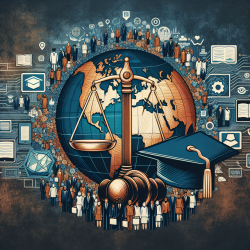The realm of special education and therapy is not isolated from global legal frameworks. Understanding international law can significantly enhance practitioners' skills, particularly when addressing complex issues that intersect with human rights. One such issue is the prohibition of Palestine Arab return to Israel, which has been identified as a potential crime against humanity. This blog post delves into how practitioners can leverage insights from international legal research to improve their practice.
The Intersection of International Law and Human Rights
International law plays a crucial role in safeguarding human rights across the globe. The right of return is a fundamental human right enshrined in various international treaties and conventions. For over seven million displaced Palestine Arabs, this right remains a contentious issue. The prohibition of their return to Israel has been scrutinized under international law as a potential crime against humanity, specifically under the category of persecution.
Understanding Crimes Against Humanity
Crimes against humanity are serious offenses defined under the Rome Statute of the International Criminal Court (ICC). They include acts like persecution, which involves severe deprivation of fundamental rights based on ethnicity or nationality. Practitioners in education and therapy can benefit from understanding these legal definitions as they often work with diverse populations who may be affected by such international issues.
Applying Legal Insights to Practice
Practitioners can apply insights from international legal research in several ways:
- Enhancing Cultural Competence: Understanding the cultural and historical contexts of populations affected by international legal issues can improve service delivery.
- Advocacy: Educators and therapists can advocate for policies that align with international human rights standards, ensuring that all students receive equitable treatment.
- Legal Compliance: Staying informed about international legal developments helps ensure that practices comply with both local and global standards.
- Professional Development: Engaging with international law through conferences, webinars, and publications can enhance professional knowledge and skills.
The Role of Research in Professional Growth
Encouraging further research into international legal frameworks can provide practitioners with deeper insights into complex global issues. By engaging with academic research, professionals in education and therapy can develop innovative solutions to challenges faced by diverse populations.
The research article "Prohibition of Palestine Arab Return to Israel as a Crime Against Humanity" offers a comprehensive analysis of the legal implications surrounding this issue. It highlights the jurisdictional challenges faced by the ICC and underscores the importance of adhering to international human rights laws.
Prohibition of Palestine Arab Return to Israel as a Crime Against Humanity
Conclusion
The intersection of international law and human rights provides valuable insights for practitioners in education and therapy. By understanding these frameworks, professionals can enhance their skills, advocate for equitable policies, and ensure compliance with global standards. Engaging with research not only broadens professional knowledge but also contributes to more effective service delivery for all students.










